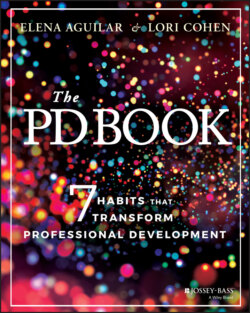Читать книгу The PD Book - Elena Aguilar - Страница 18
Transformative Professional Development
ОглавлениеThis book's premise is that all PD can and must be transformative. To understand what transformative PD is, let's start with its opposite: transactional PD. PD that is transactional is characterized by the following:
Learners are seen as passive subjects who need to be filled with knowledge that they are lacking.
An expert on the stage transmits knowledge to learners.
The emphasis of the learning is on acquiring new knowledge.
The unspoken goal of the training is to ensure compliant behavior from the subjects.
Rewards are often offered for acquiring knowledge and performing desired behavior; veiled threats may be suggested for not doing so.
If you've ever attended a sit‐and‐get training, you've experienced transactional PD. If you've felt like PD sessions were packed and you didn't have a moment to think and you were a little nervous about whether you were doing the right thing and whether the presenter would call you out and embarrass you, you may have been in a transactional PD session. If you've attended a PD session where you knew there were right and wrong answers, you were likely in a transactional PD session.
So, what makes PD transformative? To answer that, we need to begin with defining transformation. On an individual level, transformation occurs in the domains of “the Three Bs”—in a person's behaviors, beliefs, and ways of being (Aguilar, 2013). Transformation is not just about doing something different, but also about unpacking the mindsets connected to the actions.
Let's understand this by comparing two PD sessions on diverse representation in curriculum. In what we'll call Session A, teachers are presented with a slideshow and lecture explaining the research on “mirrors and windows” (Sims Bishop, 1990). (A mirror is a story that reflects your own culture and helps you build your identity; a window offers you a view into someone else's experience.) Subsequently, they are presented with a list of books that they must teach to diversify their curriculum.
In contrast, in what we'll call Session B on the same topic, teachers are guided through a reflection on their own identity experiences, they explore their beliefs about the need for students to read books that are mirrors and windows, and they have opportunities to discuss the emotions that arise when teaching books with characters whose identities they don't share. They might also review some of the research and listen to portions of books that could be adopted into the curriculum.
Which of these sessions could be transformative? In Session A, there's no learning going on. In Session B, there's the potential for learning.
Here's another example. At some point in their careers, many teachers attend PD on classroom management. When the PD consists of being told to do this and that, or don't do this or that, very little learning is happening. A transformative PD session on classroom management likely includes the following:
An exploration of how to develop relationships with students and of the beliefs that teachers have about power, control, and respect
Opportunities for teachers to practice using new strategies and to get feedback
Time for teachers to recognize and acknowledge the stew of emotions that they experience in the profession
A deconstruction of the beliefs the lie beneath traditional approaches to classroom management, and an opportunity to redefine management
A chance for learners to make the connection between management strategies and their vision for themselves as teachers and people
Transformative PD—PD that changes behaviors, beliefs, and ways of being—is holistic and comprehensive. Too many PD providers focus exclusively on behavior change, and while ultimately facilitators of transformational PD aspire to see changes in practitioners' behaviors, we know that we must also address, explore, and change beliefs and ways of being. Behaviors will change permanently, and the outcome will be transformative only when we also reckon with our beliefs and ways of being.
In writing this book, we grappled with a choice: to label our approach to professional development transformative professional development or to write about professional development without the adjective transformative. Because we define PD as something that changes participants, we believe that the term PD should always refer to learning experiences that are transformative. And so, when we talk about PD, we mean transformative PD. That said, in this book, we'll often include the adjective transformative to remind you of our vision for PD.
In Table 0.1, you'll read a synopsis of our definition of professional development.
Table 0.1 What PD Is and Isn't
| Professional development is… | Professional development isn't… |
|---|---|
| A transformative process in which learners are actively engaged and for which the aim is to explore and expand behaviors, beliefs, and ways of being; a learning process that results in a change of practice. | A transactional process in which learners are passive subjects who are asked simply to change their behaviors. |
| A structure for learning. The purpose of PD is to help people change their practice through exploring their beliefs and ways of being.Required for everyone because we all need to learn and grow.A dynamic, holistic experience. Humans learn with and through our minds, hearts, and bodies.A process to cultivate self‐awareness and understanding, social awareness and understanding, community development, and individual and collective empowerment.A vehicle for social transformation. | A thinly veiled form of control. The goal of PD is not compliance.An opportunity for massive amounts of information to be forced on someone.A punishment for not performing well in a position.An isolated experience, a one‐time event.A vehicle to maintain the status quo. |
